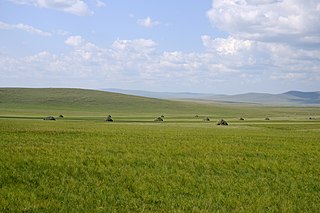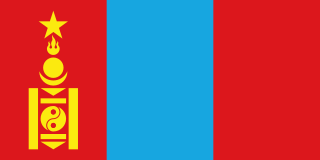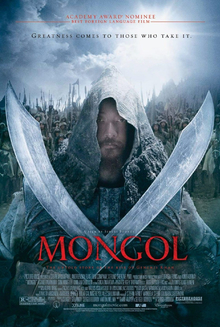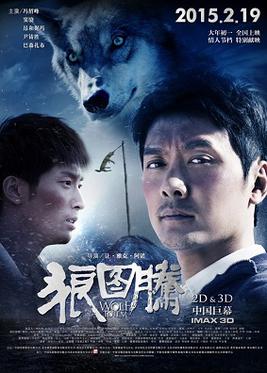Related Research Articles

The Mongols are an East Asian ethnic group native to Mongolia, Inner Mongolia in China, and the Buryatia Republic of the Russian Federation. The Mongols are the principal member of the large family of Mongolic peoples. The Oirats in Western Mongolia as well as the Buryats and Kalmyks of Russia are classified either as distinct ethno-linguistic groups or subgroups of Mongols.

Mongolia is a landlocked country in East Asia, bordered by Russia to the north and China to the south. The western extremity of Mongolia is only 23 km (14 mi) from Kazakhstan, and this area can resemble a quadripoint when viewed on a map. It covers an area of 1,564,116 square kilometres, with a population of just 3.3 million, making it the world's most sparsely populated sovereign state. Mongolia is the world's largest landlocked country that does not border a closed sea, and much of its area is covered by grassy steppe, with mountains to the north and west and the Gobi Desert to the south. Ulaanbaatar, the capital and largest city, is home to roughly half of the country's population.

Inner Mongolia, officially the Inner Mongolia Autonomous Region, is an autonomous region of the People's Republic of China. Its border includes two-thirds of the length of China's border with the country of Mongolia. Inner Mongolia also accounts for a small section of China's border with Russia. Its capital is Hohhot; other major cities include Baotou, Chifeng, Tongliao, and Ordos.

Mongolian is the official language of Mongolia and both the most widely spoken and best-known member of the Mongolic language family. The number of speakers across all its dialects may be 6.2 million, including the vast majority of the residents of Mongolia and many of the ethnic Mongol residents of the Inner Mongolia Autonomous Region of the People's Republic of China. In Mongolia, Khalkha Mongolian is predominant, and is currently written in both Cyrillic and the traditional Mongolian script. In Inner Mongolia, it is dialectally more diverse and written in the traditional Mongolian script. However, Mongols in both countries often use the Latin script for convenience on the Internet.

The Mongolian People's Republic was a socialist state which existed from 1924 to 1992, located in the historical region of Outer Mongolia in East Asia. Until 1990, it was a one-party state ruled by the Mongolian People's Revolutionary Party, and maintained close political and economic ties with the Soviet Union, as part of the Eastern Bloc.

Naadam is a traditional festival celebrated in Mongolia, Inner Mongolia and Tuva. The festival is also locally termed "eriin gurvan naadam", "the three games of men".
This is the list of winners and nominees of the César Award for Best Foreign Film.

The culture of Mongolia has been shaped by the country's nomadic tradition and its position at the crossroads of various empires and civilizations. Mongolian culture is influenced by the cultures of the Mongolic, Turkic, and East Asian peoples, as well as by the country's geography and its history of political and economic interactions with other nations.

Mongolia is divided into 21 provinces or aimags and one provincial municipality. Each aimag is subdivided into several districts. The modern provinces have been established since 1921. The capital, Ulaanbaatar, is governed as an independent provincial municipality separate from Töv Province, inside which it is situated.

The Mongolia national football team represents Mongolia in international football and is controlled by the Mongolian Football Federation.

Urga is a 1991 Russian drama film by Russian director, screenwriter and producer Nikita Mikhalkov. It was released in North America as Close to Eden. It depicts the friendship between a Russian truck driver and a Mongolian shepherd in Inner Mongolia. The film was an international co-production between companies based in Russia and France. It received generally positive reviews from critics. It won the Golden Lion and the European Film Award for Best Film.

Mongol-Tuvan throat singing, the main technique of which is known as khoomei, is a style of singing practiced by people in Tuva and Mongolia. It is noted for including overtone singing. In 2009, it was included in the Representative List of the Intangible Cultural Heritage of Humanity of UNESCO. The term hömey / kömey means throat and larynx in different Turkic languages. That could be borrowed from Mongolian khooloi, which means throat as well, driven from Proto-Mongolian word *koɣul-aj.
The cinema of Mongolia has been strongly influenced by the cinema of Russia, which differentiates it from cinematic developments in the rest of Asia.
The Darkhad, Darqads, or Darhut (Mongolian for "Untouchables","Workmen" are a subgroup of Mongol people living mainly in northern Mongolia, in the Bayanzürkh, Ulaan-Uul, Renchinlkhümbe, Tsagaannuur sums of Khövsgöl Province; The Darkhad valley is named after them. The regional variant of Mongol language is the Darkhad dialect. In the 2000 census, 16,268 people identified themselves as Darkhad.

Mongol (Монгол), also known as Mongol: The Rise of Genghis Khan in the United States and Mongol: The Rise to Power of Genghis Khan in the United Kingdom, is a 2007 period epic film directed by Sergei Bodrov, about the early life of Temüjin, who later came to be known as Genghis Khan. The storyline was conceived from a screenplay written by Bodrov and Arif Aliev. It was produced by Bodrov, Sergei Selyanov, and Anton Melnik and stars Tadanobu Asano, Sun Honglei, and Chuluuny Khulan in the main roles. Mongol explores abduction, kinship, and the repercussions of war.

Mongolia first participated at the Olympic Games in 1964, and has sent athletes to compete in all but one Summer Olympic Games since then, being part of the boycott of the 1984 Summer Olympics led by the Soviet Union. Mongolia has also participated in the Winter Olympic Games since 1964, missing only the 1976 Winter Games.
The 17th Metro Manila Film Festival was held in 1991.

Wolf Totem is a 2015 drama film based on the 2004 Chinese semi-autobiographical novel of the same name by Jiang Rong. Directed by French director Jean-Jacques Annaud, the Chinese-French co-production features a Chinese student who is sent to Inner Mongolia to teach shepherds and instead learns about the wolf population, which is under threat by a government apparatchik.
References
- ↑ "By the Will of Chingis Khan". 12 March 2009. Archived from the original on 10 February 2017. Retrieved 24 April 2018– via www.imdb.com.